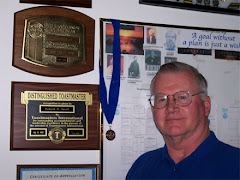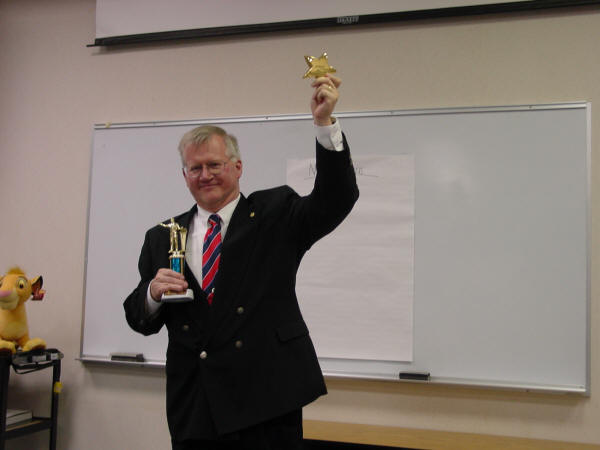Friday, March 2, 2012
I have my topic, what's next?
You have been asked to speak for 10 minutes. You have your topic. What do you do next?
Write out your speech. YES, that's what I said. Write out your speech. WHY you might ask?
Here are some things to consider.
How many words can you effectively deliver in a 10 minute time period? Well first off do you know how many words you speak per minute?
To find out you need a stop watch, and a book of average difficulty for you to read. Note your starting point then start your stop watch and begin to read "ALOUD".
Read for 1 minute, stop and count the number of words you read. Do this no less than 3 or 4 times each time reading a different passage. Count the number of words you spoke/read each time. Here is an example.
(125, 123, 122, 127) The add those numbers together and divide by the number of times you did the exercise.
(125+123+122+127=497 497/4=124.25 or 124 words per minute average.
So now we take 124 words times the 10 minutes alloted time right!
124 x 10=1240 words for 10 minutes.
"NOT QUITE".
Even in a eulogy you can have humor. If I am scheduled to talk for 7 minutes I am going to plan at least 2 or 3 humorous stories about that person. After all they were human.
I am speaking at a eulogy on June 16th. Lets say I have been given 7 minutes speaking time. I speak at 125 words per minute. There are 50 people in the audience. Maybe I am planning on 3 pauses to emphasis some major points about that person.
Here is how the calculation might look.
125 words per minute.
7 minutes alloted time.
875 I can have 875 total words in my talk right? "NO".
What about the laughter I planned to use is there an impact?
Laughter increases depending on audience size
20 - 30 people = 3 to 5 seconds in laughter
40 - 100 people 6 to 8 seconds in laughter
100 + people = 8 to 12 seconds in laughter
So with 50 people in my audience I plan 3 humorous snipets.
(8 x 3 = 24 seconds) I now have 6 minutes and 36 seconds available
for spoken words.
What about the pauses I have planned is there an impact?
I have planned 3 pauses at 3 seconds each so 3x3=9
seconds. So I now have 6 minutes and 36 seconds minus 9
seconds will equal 6 minutes and 27 seconds available to speak.
So if I round it out to 6:30 seconds of speaking time, I really have
125 x 6.5 = 812 words available to me to present in that 6
and a half minutes.
But the most respectful thing to do for your audience would be to plan on 800 words. That would be a 75 word difference from the orginal plan.
Finishing in less than the alloted time is the goal.
Why is that important?
It's about being respectful of the audiences time.
It's about being respectful of the other speakers.
It's about being respectful of the organizers of the event.
And if you want the people you are speaking to, or representing
to repect you, you need to respect them by planing ahead.
And if you don't know how to keep within time.
And believe me they will know if you are over time or not.
You will not be successful in your persentation.
Have you ever heard a speaker say "I know I'm over time but"
What they are really saying is "I'm" more important than you and your time. Without your permission they have no right to "steal" your time.
BEWARE, YOUR REPUTATION MAY DEPEND ON IT.
I'm Bob Freel and that,s "What I've Learned".
Thursday, March 1, 2012
Call Backs - What and How
On December 1st I was scheduled to give a 5 minute presentation along with 18 other speakers. I had prepared my talk to include a humorous old joke that I had planned to tie into my opening.
As I was listening to the 10 speakers before me I noticed that 3 of them made references to their C & D grades in school(to great laughter). At least 2 of them talked about overcoming their earlier poor performances to achieve their college degrees. As I listened it dawned on me what a wonderful opportunity they had laid at my feet. I scrapped my opening and while standing in the wings waiting to be announced I came up with the following.
" Howdy --- While sitting in my seat listening to Kent, Tom and Randy give their presentations I notice them bragging about how bad their grades were in school and how hard they worked to overcome them. When I got out of the Army my college grade point average was 1.69 (laughter). I then made comments about the fact that once you earn 120 units you a qualified for a Bachelors of Science Degree. I graduated with 180 units (laughter). In fact I not only have a BS Degree I also have 2 Masters Degrees hanging on my will at home. And I did it the easy way, I married a woman who had 2 of them (lots of laughter).
The Definition of a Call back is: To paraphrase -
(Stand up Comedy the Bood - by Judy Carter
A call back can be a reference to any subject, emotion or phrase that previously got a laugh. The orginal joke must stand on it own.
(Step by Step to Standup comedy - by Greg Dean
A joke that refers back to another joke performed earlier in the day, often presented in a different context.
(Comedy Writing Secrets - by Mel Helitzer)
A call back is a reference to something said earlier in a routine or sketch. For a callback to work the time between the original and the callback to that event/joke/comment must be brief.
A call back should never be repeated more than 3 times in a presentation. The purpose is to help the audience feel part of a shared experience.
For speakers it could mean a reference back to an action/joke/comment or experience that the audience has shared with the speaker and presented in a humorous manner.
Toastmasters In Prison
Leadership skills taught to prison inmates
By Laurie Rathbun
2/9/2007 2:40:58 PMBob Freel of Menifee does volunteer work that few others are willing to do. One evening a week, he goes to the California Institute for Women near Corona and teaches leadership and communication skills to inmates who belong to a Toastmasters club in the prison. Freel, 64, is a Distinguished Toastmaster and started volunteering in 2003 when he became an area governor of six clubs in the Inland Empire. “It was a culture shock,” he said remembering his first visit to the prison. “I was one of those people who thought lock them up and throw away the key.” He views the inmates now as human beings that have made mistakes. “I think a lot of them have paid their debt and deserve a second chance,” he said. In fact, he has written to Governor Arnold Schwarzenegger to help parole some of the inmates.
Darrell Zeller, a former Toastmasters’ district governor in the Inland Empire, founded the club in 2002. Freel helps Zeller and another Toastmaster Randy Amelino run it. Freel said he’s known as the “Professor” because he teaches the inmates how to speak and build their confidence. The club meets on Thursday nights in two sessions and has more than 40 members. It costs the inmates about $65 to become members and most are determined to stay in it and complete the Toastmasters’ Competent Communication manual.
Freel said that 80 to 90 percent of them complete the manual and advance to another level. This past year, a club member became a Distinguished Toastmaster, which is the highest recognition attainable. She was the first incarcerated prisoner to do so. “We were all very proud of her,” Freel said. Most of the club’s inmates are serving life sentences. “I have worked with some women who have been very prominent in the newspapers in the last 40 years,” Freel said. He can’t disclose their names due to confidentially rules.
Freel has never felt that he was in physical danger from the inmates. He had to go through non-custodial training to volunteer and follows the same rules and regulations as the prison guards. He commented that it’s hard to get other Toastmasters to volunteer with the prisoners because they’re afraid, which he understands. “It’s a different environment,” he said. “You get tested. You have to earn their respect.”
Freel became involved with Toastmasters about 11 years ago when he took a Dale Carnegie management and leadership training course through his job. “I went through the course and part of every meeting you got up and gave a short talk for one to two minutes,” he said. He did well and wanted to improve his speaking skills so his instructor recommended that he join Toastmasters. He joined it in 1995 in Corona where he was living at the time.
Freel moved to Menifee in 2005 with his wife Gloria, 56. She’s the associate director of the Ontario City Library. He’s semi-retired and works one day a week for the United States Postal Service as a rural route carrier in Canyon Lake. Before that he was an operations support manager for 30 years at commercial and aerospace companies. Freel is a member of five Toastmasters clubs. He attends 10 to 12 meetings a month in Escondido, Temecula, Riverside and Woodbridge.
There are 10,500 clubs worldwide with 211,000 members. For more information about Toastmasters International, visit its Web site at www.toastmasters.org.
Comments or Questions about this piece?
Photo: Laurie Rathbun photoMenifee resident Bob Freel is a Distinguished Toastmaster and teaches leadership and communication skills to inmates at the California Institute for Women near Corona.
All contents copyright The Valley News Inc.Arts ·
The Valley News Inc. 27464 Commerce Center Drive, Temecula, CA 92590
Subscribe to:
Comments (Atom)




